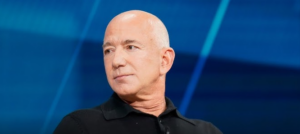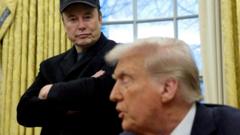The Bezos Earth Fund has ended its support for the Science Based Targets Initiative, marking a potential shift in priorities as the organization seeks new funding amidst debates on carbon credits and the growing involvement of Amazon in defense and satellite communications ventures.
Jeff Bezos' Earth Fund Halts Support for Major Climate Initiative Amid Shifts in Strategy

Jeff Bezos' Earth Fund Halts Support for Major Climate Initiative Amid Shifts in Strategy
The decision by Jeff Bezos' Earth Fund to stop funding the Science Based Targets Initiative raises questions on the future of corporate climate action.
Jeff Bezos’ Earth Fund has announced it will cease funding the Science Based Targets Initiative (SBTi), a pivotal global organization responsible for assessing corporate compliance with the emission reduction targets under the Paris Climate Agreement. This strategic move comes at a time of political volatility, particularly as former U.S. President Donald Trump officially withdrew the U.S. from the Paris Agreement, prompting speculation about a significant change in Bezos’ approach to climate activism.
Previously, the Earth Fund had been a substantial supporter of SBTi, contributing £14.5 million as a grant in 2021. However, that funding will naturally lapse in 2024, leading SBTi to seek alternative financial backers to sustain its operations and validation services. The decision follows reports indicating that the Earth Fund, along with advisors associated with former U.S. climate envoy John Kerry, endorsed more extensive reliance on carbon credits—a contentious topic regarding its lasting impact on genuine emission reductions.
Despite this shift in financial support, Bezos continues to engage in various climate initiatives. At a recent event hosted by the New York Times, he underscored the urgent need to address environmental challenges. His foundation remains committed to supporting key projects, including the Greenhouse Gas Protocol and the World Resources Institute.
In parallel with these developments, Amazon is broadening its footprint in the defense sector. The company has recently won a £670,000 consultancy contract with the UK’s Ministry of Defence to evaluate next-generation space communication systems. This endeavor is tied to Amazon’s satellite project, Project Kuiper, and aims to strengthen collaborations among military, governmental, and private satellite networks.
According to industry sources, executives from Amazon Kuiper have been actively seeking partnerships within the UK's defense landscape as the nation gears up to deploy a new generation of communication satellites. This pursuit aligns with the UK’s efforts to finalize bidders for its substantial £5 billion Skynet 6 military satellite program, with notable aerospace players like Airbus and Lockheed Martin in contention. Additionally, the government is weighing the development of a new intelligence satellite network valued at £1 billion.
Amazon’s foray into the UK government contracts related to its AWS business further solidifies its role in the nation’s defense and digital infrastructure. The UK’s telecom regulator, Ofcom, has recently provided Amazon with a license to offer satellite broadband services, further intensifying competition with Elon Musk’s Starlink.
As Bezos continues to recalibrate his climate efforts while venturing deeper into defense and space initiatives, observers are left to ponder the implications of these evolving priorities. Whether this culminates in a broader strategic pivot for Bezos and his ventures remains uncertain, but clearly, his influence is expanding across both environmental and military domains.



















